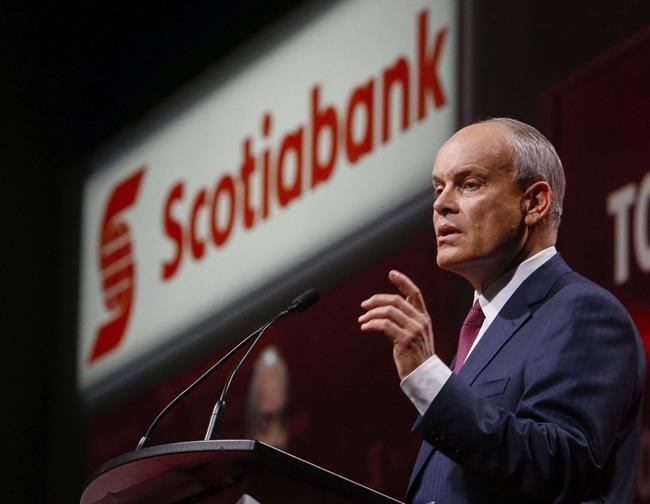OTTAWA — The final message to Scotiabank shareholders from its president and CEO's annual address: a higher tax on the country’s biggest banks is a tax on you.
Brian Porter called a tax hike that's widely expected to be included in Thursday's budget a “knee-jerk reaction that sends the wrong message to the global investment community."
He made the comments in written remarks prepared for Tuesday's annual shareholder meeting, but he did not deliver the address in person.
The financial industry is bracing for changes to its tax rate after the confidence and supply agreement between the Liberals and the NDP included a pledge to move forward on tax changes “in the near term.”
NDP Leader Jagmeet Singh said Tuesday that ensuring those who have benefited from the pandemic “start paying their fair share” was a key element of the deal with the Liberals, though it's not clear what specific changes the government may be exploring.
During the 2021 election campaign, Prime Minister Justin Trudeau promised a corporate tax surcharge on the country's biggest banks and insurance companies.
The Liberals estimated taxing profits over $1 billion at 18 per cent instead of 15 would bring in about $1.2 billion a year.
On the campaign trail, Trudeau also promised a four-year “recovery dividend” that he said would be a temporary way for banks to help with the pandemic recovery, given that they’ve fared relatively well throughout.
The Liberals said they’ll use the extra money to help Canadians struggling to afford record home prices — although that was before they struck a deal with the NDP.
The list of the parties’ shared priorities now includes pressing commitments like implementing dental care for the children of low-income earners this year and creating a pharmacare program.
But some economists argue the policy doesn’t make sense.
Ian Lee, a professor at the Sprott School of Business at Carleton University, said a tax hike “makes for great optics.”
“Either directly or indirectly, they’re saying 'Look, this is how we’re going to go after inequality,'” he said. “We’re going to go after those big fat rich banks.”
The Canadian Bankers Association says the net income of the six largest banks was $46.6 billion in 2019, and that they collectively paid $12.7 billion in taxes to all levels of government that year.
The organization Canadians for Tax Fairness is calling for a suite of changes in this budget that it says will raise another $92 billion a year in government revenue. That includes a “pandemic-based excess profits surtax” on corporations, and raising the corporate tax rate to 20 per cent across the board.
Lee said a higher tax bill won’t translate into lower profits for corporations, which will simply absorb the extra cost and pass it on to customers or workers.
“It’s just another cost of doing business. There’s nothing magical or special about taxes,” he said.
But the next several Liberal budgets depend on the support of the NDP, and that party wants to go further.
“This shouldn’t just be about banks, it should also be about big grocery chains, the big box stores, oil companies,” said NDP MP Niki Ashton.
The Canadian Centre for Policy Alternatives’ senior economist David Macdonald said he thinks a tax for banks is “a certainty for this budget,” and the question for him on Thursday is whether it goes further.
The banks, for their part, are saying little.
CIBC’s president and CEO, Victor Dodig, told a group of investors during an earnings call in August that banks have “always been in the crosshairs.”
“Most Canadians, whether through large pension plans or through their own investments, have investments in banks and they benefit from those dividends that we pay and they benefit from our economic growth,” he said.
CIBC, RBC, Scotiabank and National Bank of Canada did not agree to an interview. TD Bank and BMO did not respond to a request for comment.
The Canadian Bankers Association also declined to comment, pointing to a statement it released during the election campaign arguing that bank profits maintain stability in the financial system, “ensuring the safety and security of Canadians’ deposits,” and highlighting that many banks and their employees donate to charity.
This report by The Canadian Press was first published April 6, 2022.
Sarah Ritchie, The Canadian Press



